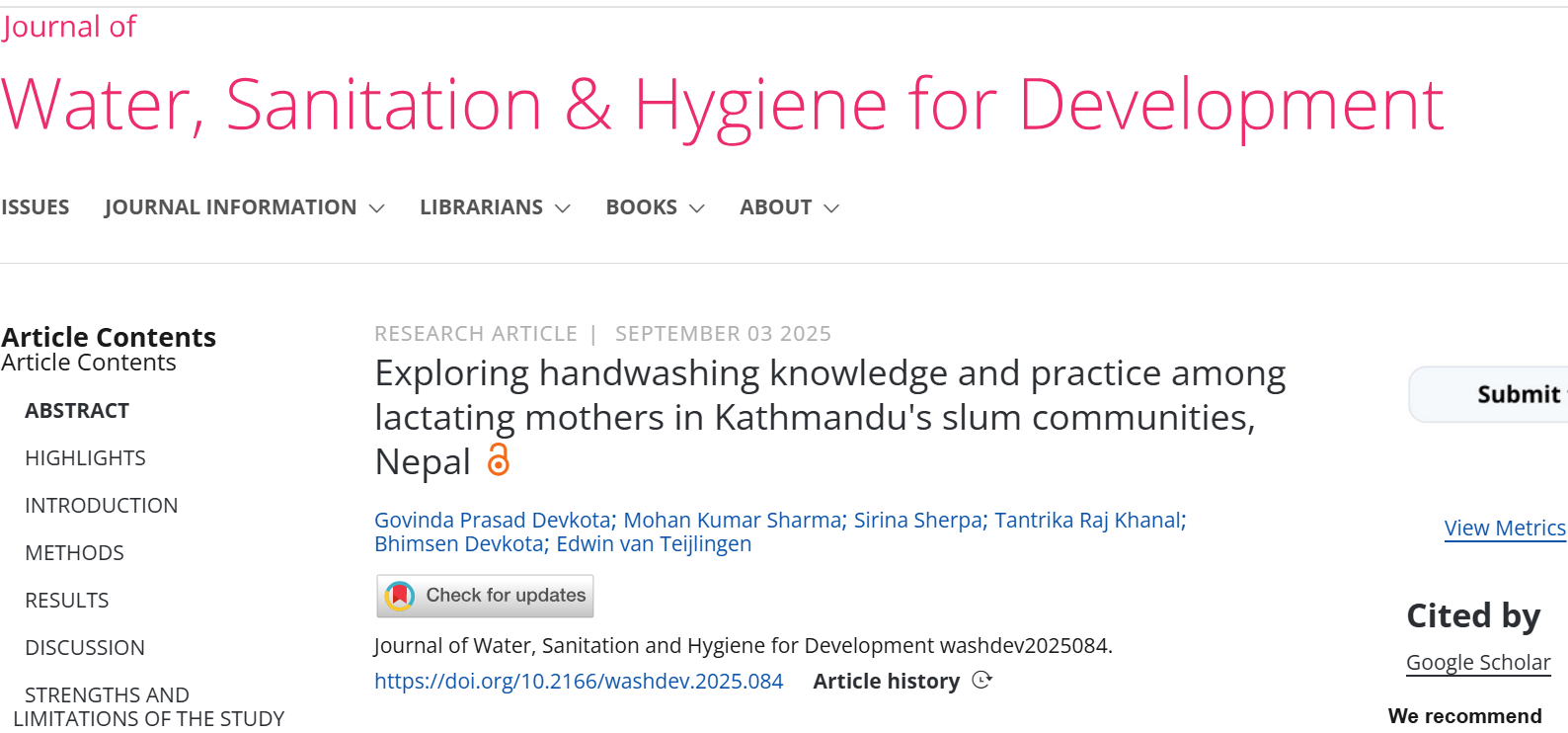Last week the international Journal of Water, Sanitation and Hygiene for Development emailed to tell that our paper ‘Exploring handwashing knowledge and practice among lactating mothers in Kathmandu’s slum communities’ [1] had been accepted for publication.
It is widely known that poor access to good quality water, sanitation, and hygiene (WASH) lead to high morbidity in young children. The paper reports on a cross-sectional study conducted with 127 breastfeeding mothers in two slum settlements in Nepal’s capital. It found that most had a good knowledge of WASH and appropriate washing of hands. However, the prevalence of illness among children whose mothers had only basic education was 26% higher than those whose mothers had completed secondary education. Family income and hand-washing practice were also significantly associated with child health (p < 0.01). Nearly three in four (73.2%) of children had experienced health issues, particularly diarrhoea, in the past half year.
The authors concluded that strengthening maternal hand-hygiene education programmes, particularly for lactating mothers, and improving WASH infrastructure are necessary, as well as promoting affordable hand-washing solutions in urban slums.
Prof. Edwin van Teijlingen

Reference:
- Devkota, G.P., Sharma, M.K., Sherpa, S., Khanal, T.R., Devkota, B., van Teijlingen, E. (2025) Exploring handwashing knowledge and practice among lactating mothers in Kathmandu’s slum communities, Nepal, Journal of Water, Sanitation and Hygiene for Development, 15:1-10. doi: 10.2166/washdev.2025.084












 Visiting Prof. Sujan Marahatta presenting at BU
Visiting Prof. Sujan Marahatta presenting at BU 3C Event: Research Culture, Community & Can you Guess Who? Friday 20 March 1-2pm
3C Event: Research Culture, Community & Can you Guess Who? Friday 20 March 1-2pm Beyond Academia: Exploring Career Options for Early Career Researchers – Online Workshop
Beyond Academia: Exploring Career Options for Early Career Researchers – Online Workshop UKCGE Recognised Research Supervision Programme: Deadline Approaching
UKCGE Recognised Research Supervision Programme: Deadline Approaching SPROUT: From Sustainable Research to Sustainable Research Lives
SPROUT: From Sustainable Research to Sustainable Research Lives ECR Funding Open Call: Research Culture & Community Grant – Apply now
ECR Funding Open Call: Research Culture & Community Grant – Apply now ECR Funding Open Call: Research Culture & Community Grant – Application Deadline Friday 12 December
ECR Funding Open Call: Research Culture & Community Grant – Application Deadline Friday 12 December MSCA Postdoctoral Fellowships 2025 Call
MSCA Postdoctoral Fellowships 2025 Call ERC Advanced Grant 2025 Webinar
ERC Advanced Grant 2025 Webinar Update on UKRO services
Update on UKRO services European research project exploring use of ‘virtual twins’ to better manage metabolic associated fatty liver disease
European research project exploring use of ‘virtual twins’ to better manage metabolic associated fatty liver disease